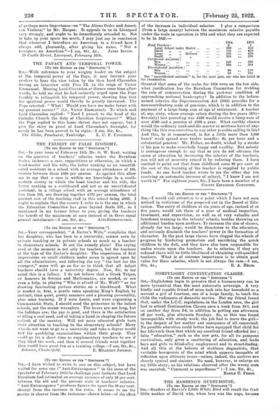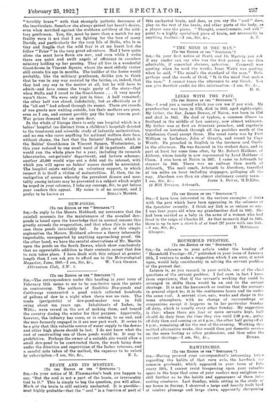THE BAMBINO'S GUEST-HOTJSE. (To THE EDITOR OF TIM "SPECTATOR."] Snt,—Readers
of Barrie's Little White Bird will recall the frail little mother of David who, when love was the urge, became
terribly brave" with that strangely pathetic fierceness of the inarticulate. Somehow she always gained her heart's desire, even when matched against the stubborn artillery of the mili- tary gentleman. You, Sir, must be more than a match for my frailty were it not that I am fighting for the love of many Davids, and particularly for the very life of Stella, who is so tiny and fragile that the wild fear is at my heart lest she follow "Peter " in the very great adventure. Had I been quite alone she must have flown ere now, and even while I write there are quiet and swift angels of efficiency in ceaseless ministry holding up her passing. They all live in a wonderful Guest-house in Vincent Square, where the most elderly visitor still counts his age in months. The builder of the house would probably, like the military gentleman, dislike you to think that he was in any way assisted by the fairies, or, indeed, that they had any say in the matter at all, but he will have to admit—and here comes the tragic party of the story—that when Stella and I raced to the Guest-house . . . it very nearly wasn't there. We were only just in time. A half remained; the other half was closed, indefinitely, but as effectively as if the "all out" had echoed through its rooms. There are crowds of wee guests now waiting outside, but their mothers are poor, even as I am, and cannot possibly pay the huge ransom post- War prices demand for an open door.
In the whole of Europe there is only one hospital which is a babies' hospital (as distinct from a children's hospital) devoted to the treatment and scientific study of infantile malnutrition, and no one who cares anything for national welfare dare face, without shame, the fact that the Infants' Hospital, which is the Babies' Guest-house in Vincent Square, Westminster, is this year reduced to one small ward of 25 in-patients. £5,000 would run the whole place for a year, including its research laboratories, out-patients' department, and lecture schemes; another .e5,000 would wipe out a debt and its interest, with which you will agree no babies' names should be associated. The hospital exists entirely on voluntary support, in which "respect it is itself a victim of malnutrition. If, then, the in- vestigation of means whereby the prevalent disease and mor- tality among infants may be prevented is a subject which might be urged in your columns, I take my courage, Sir, to put before your readers this appeal. My name is of no account, and I



































 Previous page
Previous page